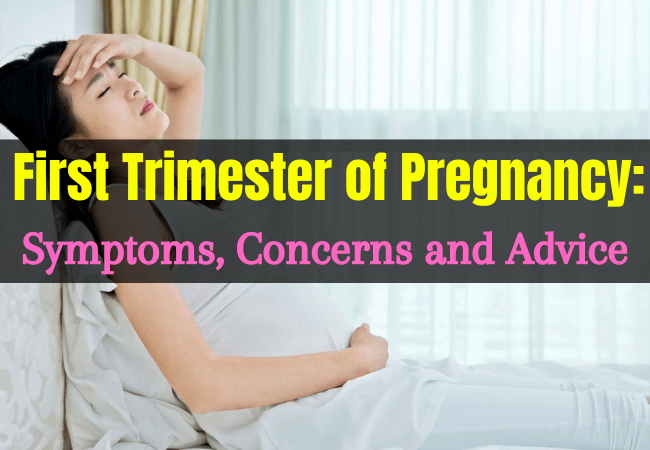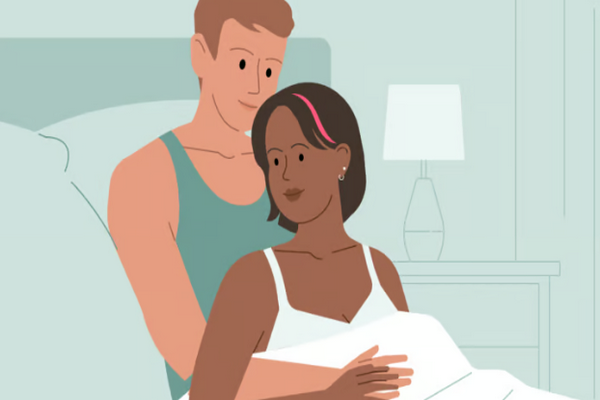First Trimester of Pregnancy: Symptoms, Concerns and Advice
What is First Trimester?
A pregnancy lasts for about 40 weeks. The weeks are grouped into three trimesters. The first trimester is the time in between fertilization of the egg by the sperm (conception) and week 12 of a pregnancy. A woman’s body goes through many changes during the first 12 weeks of a pregnancy.

Women often start to have concerns over:
- What to eat,
- Which types of prenatal tests they should consider,
- How much weight they might gain,
- How they can make sure their baby stays healthy.
Understanding a pregnancy week by week can help you make informed decisions and prepare for the big changes that lie ahead.
Symptoms That Happens To a Woman’s Body During First Trimester:
In the first trimester, a woman’s body goes through many changes. The body releases hormones that affect almost every single organ in the body. The first sign you may be pregnant is missing a period. As the first few weeks pass, some women experience the following:
- Tiredness,
- Upset stomach,
- Throwing up,
- Mood swings,
- Tender breasts,
- Heartburn,
- Weight gain,
- Headaches,
- Constipation,
- Cravings for certain foods,
- Revulsion to certain foods.
Fetus During the First Trimester:
The first day of your pregnancy is also the first day of your last menstrual period. At about 10 to 14 days after, an egg is released, combines with a sperm, and conception occurs. A baby develops rapidly during the first trimester. The fetus begins to develop a brain and spinal cord, and the organs begin to form. The baby’s heart will also begin to beat during the first trimester.
You can read: Pregnancy Sign, Symptoms and Confirmation Test
Arms and legs begin to bud in the first few weeks, and by the end of eight weeks, fingers ana toes start to form. By the end of the first trimester, the baby’s sex organs have formed. According to the Office on Women’s Health, the baby is now about 3 inches long and weighs almost 1 ounce.
What Can Be Expected at the Doctor During the First Trimester?
When you first learn you are pregnant, make an appointment with your doctor to begin caring Tor the developing baby. If you are not already on prenatal vitamins, start them immediately. Ideally, women take folic acid (in prenatal vitamins) for a year before the pregnancy. Women normally see their doctor once a month during the first trimester.
During your first visit, a doctor will take a full health history and perform a full physical and pelvic exam. The doctor may also:
- Perform an ultrasound to confirm the pregnancy,
- Perform a Pap test,
- Take your blood pressure,
- Test for sexually transmitted infections, HIV, and hepatitis,
- Estimate your date of delivery or “due date,'” which is around 266 days from the first day of your last period,
- Screen for risk factors like anemia,
- Check thyroid levels,
- Check your weight.
At around 11 weeks, the doctor will perform a test called a nuchal translucency (NT) scan. The test uses an ultrasound to measure the baby’s head and thickness of the baby’s neck. The measurements can help determine the chance that your baby will be born with a genetic disorder known as Down syndrome.
Ask your doctor whether or not genetic screening is recommended for your pregnancy. Genetic screening is a test used to find out your baby’s risk for specific genetic diseases.
Tips for Stay Healthy in First Trimester of Pregnancy:
It’s important for a woman to be aware of what to do and what to avoid while pregnant in order to take care of themselves and their developing baby.
What to do:
- Here are good personal health measures to take during the first trimester:
- Take prenatal vitamins.
- Exercise regularly.
- Work out your pelvic floor by doing Kegel exercises.
- Eat a diet high in fruits, vegetables, low-fat forms of protein, and fiber.
- Drink lots of water.
- Eat enough calories (about 300 calories more than normal).
What to avoid:
These things should be avoided during the first trimester:
- Strenuous exercise or strength training that could cause an injury to your stomach,
- Alcohol,
- Caffeine (no more than one cup of coffee or tea per day),
- Smoking,
- Illegal drugs,
- Raw fish or smoked seafood (no sushi),
- Shark, swordfish, mackerel, or white snapper fish (they have high levels of mercury),
- Raw sprouts,
- Cat litter, which can carry a parasitic disease called toxoplasmosis,
- Unpasteurized milk or other dairy products,
- Deli meats or hot dogs.
More questions related to this article:
- What do you mean by first trimester?
- Write down the symptoms that happen to a woman’s body during the first trimester.
- What happens to a woman’s body during the first trimester?
- What happens to the fetus during the first trimester?
- What are the tips for stay healthy in 1st trimester of pregnancy?











